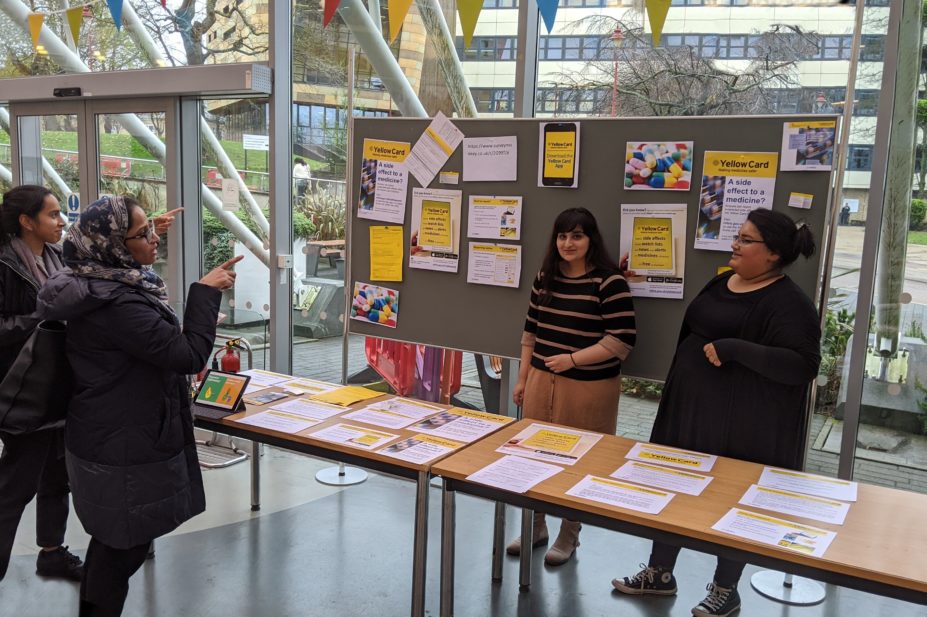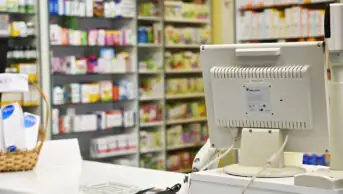
Babir Malik
In the late 1950s, a drug called thalidomide, given to pregnant women for morning sickness, led to thousands of babies being born with serious defects. So in 1964, to make sure this tragedy would never be repeated, the UK founded its Yellow Card scheme (YCS) — encouraging healthcare professionals to report serious or unknown adverse drug reactions (ADRs) experienced by their patients.
Despite this initiative being so well established, only 22% of Yellow Cards in 2018 were submitted by pharmacists or pharmacy staff, the experts in medicines. Perhaps we could be doing more to safeguard patients against medication-related harm.
So this is why Hadar Zaman and Babir Malik, academics at the University of Bradford, got involved with the Medicines and Healthcare products Regulatory Agency (MHRA), which manages the scheme, to create the YCS student champions — us a group of pharmacy students dedicated to promoting medicines safety.
Our main purpose is to spread the word about Yellow Card reporting around our university campus and local areas. As student champions, we are making sure that as many people as possible know what Yellow Card reporting is; we are empowering our fellow students, staff, relatives and patients to fill in these reports; and we are increasing the number of adverse drug reaction reports by pharmacists and pharmacy staff.
Before we were trained up, we admit that we had little knowledge of the YCS and why we need it. Now that we’re clued up, we’ve had a chance to think about why people like us weren’t very aware of the scheme, and why people may not be reporting suspected ADRs.
In May 2019, with the support of MHRA representatives, we hosted the first ever YCS training workshop at the University of Bradford, which included training sessions about the MHRA and how the scheme works. Students from all years of pharmacy attended, and we were even joined by a community pharmacist who lived locally and had seen the event advertised on Twitter.
As a result of this training, we now have a better understanding of ADR reporting statistics, how ADRs compromise our patients’ health, and the impact this has on NHS expenses — this has really informed our work in spreading awareness.
For example, we learned how just one Yellow Card can make an impact, affect drug licensing, and influence the manufacturer’s cautionary advice and contraindications for a particular medicine. ADR reporting clearly prevents serious harm to patients.
We also see pharmacists’ involvement as paramount: they have a role in communicating the importance of ADR reporting to patients, and this can enhance the patient experience and increase patients’ trust in pharmacy. And, as students, we have had a chance to reflect on how we can become proactive, person-centred pharmacists in the future.
And the YCS’s influence on us doesn’t stop there: it has trickled into our studies too. Some of us are undertaking YCS-related activities while on our integrated preregistration placements. And those of us who are still at university are applying our knowledge in our module on patient safety and decision-making. Being YCS student champions is making us better students, and ultimately better pharmacists.
So that’s why we would like to see the YCS student champion initiative implemented in all university healthcare programmes. It is today’s healthcare students who will shape the future of healthcare. Let’s start thinking about our responsibilities for patient safety now.
Hana Husain, Raeesah Shahid, Ineta Morkunaite, Nabila Hussain, Yellow Card pharmacy student champions, University of Bradford
Acknowledgements: Babir Malik, Weldricks teacher practitioner, University of Bradford


